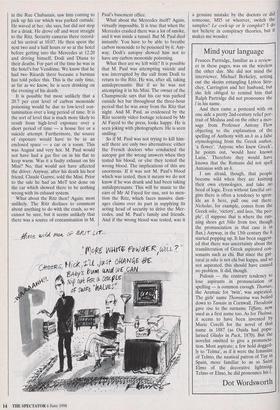Mind your language
Frances Partridge, familiar as a review- er in these pages, was on the wireless the other day. She did not mind the interviewer, Michael Berkeley, setting out the skeins• entangling Lytton Stra- chey, Carrington and her husband, but she felt obliged to remind him that Ralph Partridge did not pronounce the I in his name.
And then came a postcard with on one side a pretty 2nd-century relief por- trait of Medusa and on the other a mes- sage from Professor Antony Flew objecting to the explanation of the spelling of Anthony with an h as a false etymologising from the Greek anthos, 'a flower'. 'Anyone who knew Greek', he points out, 'would have known Latin.' Therefore they would have known that the Romans did not spell Antonius with an h.
I am afraid, though, that people become wild when they are knitting their own etymologies, and take no heed of logic. Even without fanciful ori- gins .there is often a tendency to sprin- kle an h here, pull one out there. Nicholas, for example, comes from the Greek nike, 'victory', and laos, 'the peo- ple'. (I suppose that is where the run- ning shoes get Nike from too; though the pronunciation in that case is ifl flux.) Anyway, in the 13th century the h started popping up. It has been suggest- ed that there was uncertainty about the transliteration of Greek aspirated con- sonants such as chi. But since the gut- tural in nike is not chi but kappa, and so not aspirated, this should have caused no problem. It did, though.
Psilosis — the contrary tendency to lose aspirants in pronunciation or spelling — is common enough. Thomas, the Aramaic for 'twin', was aspirated. The girls' name Thomasina was boiled down to Tamsin in Cornwall. Theodosia gave rise to the surname Tiffany, now used as a first name too. As for Thelma, it seems to have been invented by Marie Corelli for the novel of that name in 1887 (as Ouida had popu- larised Gladys in Puck, 1870). But the novelist omitted to give a pronuncia- tion. Most aspirate; a few hold dogged- ly to 'Telma', as if it were the feminine of Telmo, the nautical patron of Tuy.m Spain, more familiar to us as Saint Elmo of the decorative lightning. Telmo or Elmo, he did pronounce his I.
Dot Wordsworth


























































 Previous page
Previous page